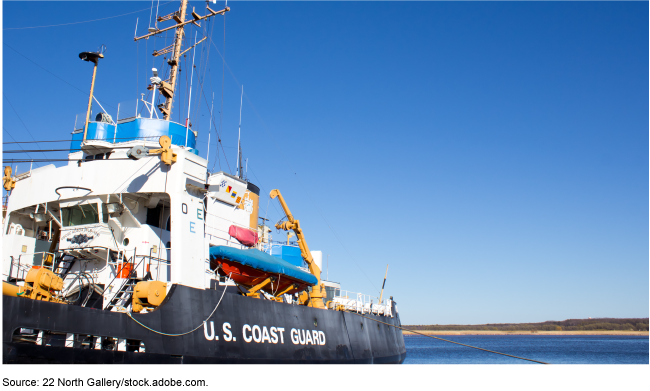Coast Guard: Actions Needed to Improve Mission Execution and Resource Management
Fast Facts
The Coast Guard has 11 mandated missions. To operate effectively, it must use its resources wisely while planning for and investing in future operations.
We testified that the Coast Guard could do more in some areas. For instance, the Coast Guard is required to collect and report data on marine accidents and casualties to inform safety guidelines and regulations. However, it doesn't collect potentially useful information about the use of life-saving equipment, such as rescue lifeboats, in marine accidents.
We've made 39 recommendations to address this and other related issues. As of June 2023, the Coast Guard has implemented 7 of them.

Highlights
What GAO Found
The Coast Guard—a multi-mission, maritime military service—has various authorities that enables it to conduct its statutory missions. Ensuring that the Coast Guard collects, uses, and reports complete and accurate information to manage its missions is critical to the Coast Guard's ability to meet its mission demands and efficiently manage resources. While the Coast Guard has taken steps to more effectively carry out its missions, GAO's recent work identified specific actions the Coast Guard could take to improve mission execution and better manage resources. For example:
- Collect better vessel accident information. In March 2021, GAO reported that the Coast Guard has the authority to collect more information on marine accidents, which could help it assess the efficacy of lifesaving equipment and improve marine safety. GAO recommended that the Coast Guard revise its vessel accident investigations guidance to require Coast Guard investigators to collect information on the date of birth, known disability, and use of lifesaving equipment of people in vessel accidents. According to Coast Guard officials, without statutory or regulatory requirements, the Coast Guard does not intend to collect the additional information unless it is necessary to determine causal factors of a vessel accident or personnel casualty. GAO maintains this recommendation is important because without this information, the Coast Guard cannot fully assess the efficacy of lifesaving equipment that could help it identify opportunities to improve marine safety.
- Collect and assess information related to gas carrier examinations. In January 2022, GAO reported that the Coast Guard is required to conduct annual examinations of gas carriers; however, it faces a shortage of marine inspectors, which can lead to examination delays, according to industry representatives. GAO recommended that the Coast Guard assess the benefits and risks of adopting a risk-based approach for conducting gas carrier compliance exams and take actions to address the results, as appropriate and feasible. As of February 2023, the Coast Guard started an information collection study to assess the effectiveness of a risk-based approach to the examinations. Such actions should help ensure that the Coast Guard is efficiently and effectively using its marine inspection resources.
- Report shore infrastructure information more completely and accurately. In February 2019, GAO reported that the Coast Guard had not provided complete information to Congress about its funding needs for shore infrastructure. For example, it did not describe trade-offs among competing shore infrastructure projects, and the impacts on mission execution from shore facilities in disrepair. GAO recommended that the Coast Guard include supporting details about competing project alternatives and report trade-offs in congressional budget requests and related reports. The Coast Guard agreed with GAO's recommendation, but noted challenges with addressing it. GAO maintains this recommendation is important because without such information about Coast Guard budgetary requirements, Congress does not have critical information that could help to prioritize funding to address the Coast Guard's shore infrastructure needs.
Why GAO Did This Study
The U.S. Coast Guard, a branch of the armed forces located within the Department of Homeland Security (DHS), is responsible for protecting and defending more than 100,000 miles of U.S. coastline and inland waterways. It safeguards an economic region covering 4.5 million square miles. To carry out its missions, the Coast Guard must use its resources in a manner that allows it to maintain capabilities needed to execute its missions and make necessary investments for the future while operating within its existing resources.
This statement discusses GAO's prior work identifying additional areas where the Coast Guard could improve mission execution and better manage its resources.
This statement is based primarily on eight reports published from February 2019 to November 2022. For that work, GAO analyzed Coast Guard documents and interviewed agency officials.
Recommendations
GAO made 39 recommendations to the Coast Guard in the reports covered by this statement. As of June 2023, the Coast Guard has addressed seven of the 39 recommendations, and 32 remain unaddressed. GAO continues to monitor the Coast Guard's progress in addressing them.
